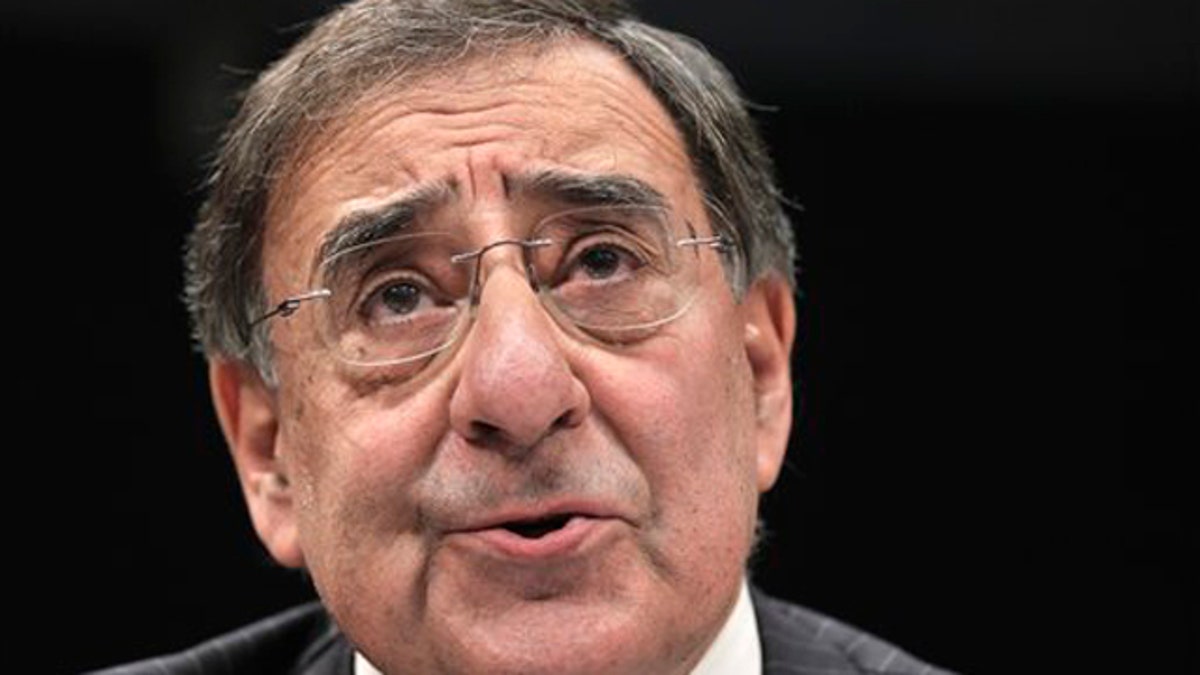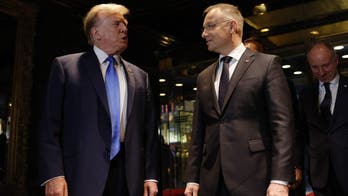
In this Feb. 10 photo, CIA Director Leon Panetta testifies before the House Intelligence Committee on Capitol Hill. (AP2011)
In a broad reshuffling of his national security team, President Obama plans to name CIA Director Leon Panetta as the next secretary of Defense and Gen. David Petraeus, the U.S. commander in charge in Afghanistan, as Panetta's replacement at the helm of the CIA, Fox News has confirmed.
Officials told Fox News that Obama is also expected to announce that Lt. Gen. John Allen would replace Petraeus in Afghanistan and that diplomat Ryan Crocker will be the next U.S. ambassador to that country.
The changes are part of a series of top nominations expected to be announced as early as Wednesday.
A senior defense official also told Fox News the president will "almost certainly" tap Gen. James Cartwright to be chairman of the Joint Chiefs of Staff. Cartwright is currently vice chairman.
The changes would probably take effect this summer. Defense Secretary Robert Gates has said he will leave at the end of June, and Petraeus was likewise expected to leave his post as Afghanistan commander.
The moves come as the United States faces a changing landscape in the Middle East and surrounding region. U.S. forces continue to work alongside NATO allies to keep Libyan leader Muammar al-Qaddafi at bay. As the Obama administration determines how to handle the unrest in other countries, including Syria, the defense team is meanwhile trying to complete the drawdown in Iraq and make more measurable progress in Afghanistan -- a task made more difficult by souring relations on the other side of the border with Pakistan.
In Afghanistan, Crocker would replace U.S. Ambassador Karl Eikenberry, who has had little-to-no relationship with Afghan President Hamid Karzai. On the diplomatic side, the change would give U.S.-Afghan civilian relations a fresh start. Officials said Tuesday the White House was weighing several factors, including Crocker's role in the larger cast change in Afghanistan policy this summer and fall.
Allen, now the deputy commander of U.S. Central Command in Florida, is due in Washington on Wednesday, and sources in Afghanistan said Petraeus was also headed to Washington.
The personnel changes are unrelated to the progress of the prolonged war but come just as Obama needs to demonstrate enough success to follow through with his pledge to begin withdrawing U.S. forces in July.
U.S. military and civilian defense leaders call 2011 the make-or-break year for turning around the Afghanistan war and laying the path for a gradual U.S. exit by 2015. The main obstacles are the uncertain leadership and weak government of Karzai, the open question of whether the Taliban can be integrated into Afghan political life and the continued safe harbor Pakistan provides for militants attacking U.S. and NATO forces over the border in Afghanistan.
A U.S. official who confirmed Panetta's move to the Pentagon said the White House chose him because of his long experience in Washington, including working with budgets at the intelligence agency, as well as his extensive experience in the field during his time as CIA director. The official said Panetta had traveled more than 200,000 miles, to more than 40 CIA stations and bases and more than 30 countries, including Afghanistan and Pakistan.
Panetta has led "the most aggressive counterterrorism operations in the history of the CIA," the official said. "A number of top Al Qaeda terrorists have been taken off the battlefield, including Al Al Qaeda's former No. 3 leader, Sheikh Said al-Masri."
Last June, Panetta played a key role in negotiating the spy swap of Russian illegals operating in the U.S. In September 2009, the CIA uncovered the covert nuclear facility in Qom, Iran.
Panetta will become the first CIA director to become secretary of Defense since James Schlesinger did nearly 40 years ago.
Current and former administration officials noted that Petraeus would bring a customer's eye to the CIA job as one of the key people to use and understand CIA and military intelligence during the wars in Afghanistan and Iraq. Petraeus claims that military advances, especially in the traditional Taliban stronghold areas of southern Afghanistan, have blunted the Taliban-led insurgency and given the edge to the U.S. and its NATO partners. A planned transition to Afghan security control begins this year, and the U.S. wants to start withdrawing some of its approximately 100,000 forces in July.
The nearly wholesale changes at the top of Obama's Afghanistan military and diplomatic lineup will leave fewer military and civilian leaders who have Obama's ear and who also have Afghanistan experience. Allen, the choice to become Afghanistan war commander, has never served there.
Fox News' Catherine Herridge and The Associated Press contributed to this report.




